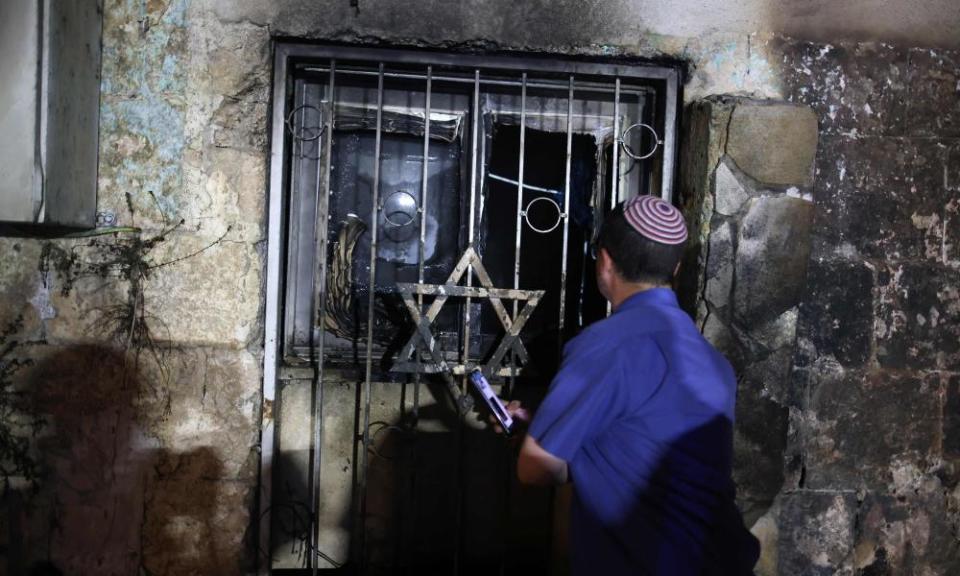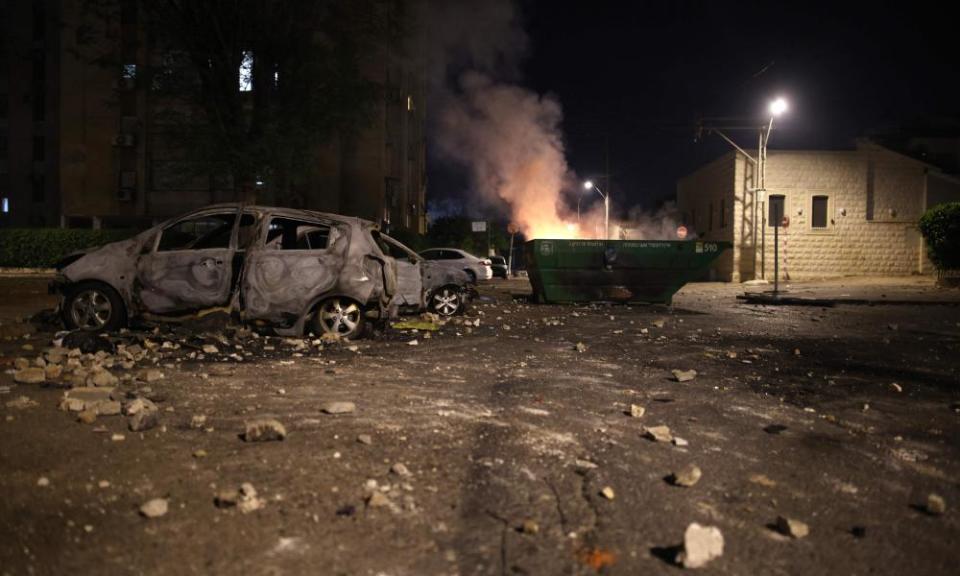Far-right Jewish groups and Arab youths claim streets of Lod as Israel loses control
A smell of petrol lingered in the air and the synagogue’s metal gate had been completely ripped from its hinges. Inside, a small room filled with colourful books for children had been blackened by smoke. Outside, the skeletons of palm trees stood charred, save for a few bits of green at the top.
“Those animals destroyed and burnt,” said Eytan Schnur of his Arab neighbours, who, he said, had torched the Jewish house of worship on Thursday night. “We will rebuild; we’ll build it bigger.”
The synagogue was the fifth to have been burnt this week in Lod, a city in central Israel that has become the focal point of a vicious and rapid rise in communal violence that has spread across the country, and which the government has failed to control.

Videos shared online have shown a terrified Arab family attempting to keep men from barging through the front door, Palestinians beating Jewish Israelis, and girls waving Israeli flags and dancing outside a smashed-up Arab-owned shop.
Far-right Jewish Israelis, often armed with pistols and operating in full view of police, have moved into mixed areas this week. In messages shared by one online Jewish supremacist group, Jews were called to flood into Lod. “Don’t come without any instrument for personal protection,” one message read.
Amir Ohana, the public security minister, has encouraged vigilantism, announcing on Wednesday that “law-abiding citizens carrying weapons” were an aid to authorities. He made the comments after a suspected Jewish gunman was accused of killing an Arab man in Lod. The minister, without presenting evidence, said it was in self-defence.

Since then, attacks have intensified. One video, apparently taken by an Arab resident, showed two Jewish Israelis filling bottles with petrol at a service station next to a white car. “The police are right next to them,” said a voice off-camera.
Police say they are working to “prevent riots and disturbances”. A history of violent crime in Lod has meant some Arab residents are armed. Israeli media have reported at least two Jewish Israelis, including a paramedic, have been shot this week.
Lod’s mayor, Yair Revivo, has described events there as a “civil war”, and the city of 80,000 people looks that way. Streets are filled with rocks and the husks of burnt cars. Most people remain indoors, and heavily armed police in riot gear loiter on pavements. Authorities have declared a rare state of emergency, imposed night-time curfews, and brought in forces from the occupied West Bank.
Many Israeli officials argue that Palestinian citizens of Israel, who make up about 20% of the population, are treated equally, feel a part of the country, and care more about jobs and economic security than they do the status and fate of non-citizen Palestinians in the neighbouring occupied West Bank and Gaza.

That logic came crashing down this week. Decades of discrimination, an escalating bombardment in and out of Gaza and an emboldened hardline far-right buoyed up by mainstream Israeli politicians has fractured any sense of “coexistence”.
In Israel, local media is calling what is happening an “internal intifada”.
“Animals are living over here,” repeated Schnur, 37, who works in the diamond trade, pointing to apartments next to the synagogue. “I have Arab friends [but] the people between 20- to 30 years old, they are starting to be much more extreme.”
Behind him, a teenage boy at the synagogue calls out, “Kill them”, before walking away.
Lod’s Arab community is the descendants of Palestinians who stayed in the country after the 1948 war surrounding Israel’s creation, when an estimated 700,000 others were expelled or fled. While life has long been relatively calm in Lod, known as Lydda in Arabic, deep-seated problems have boiled under the surface.
Mirroring Palestinian voices around Israel – and certainly in Jerusalem and the West Bank – Israel’s Arab minority in Lod have accused police of unnecessarily rough tactics in the face of peaceful demonstrations.
Mohammad Abu Shuraiki, 65, said attempts by Arabs in Lod to hold prayers this week in solidarity with the hundreds of Palestinians wounded by police at Jerusalem’s al-Aqsa mosque were met with “sound grenades and teargas canisters”.

Meanwhile, like many poor, mixed cities around Israel, Lod has been targeted by Jewish settler groups which – while primarily seeking to take land in the Palestinian territories – want to strengthen the Jewish presence of Israeli towns.
The community from the torched synagogue is part of that movement, hoping to increase the Jewish majority population of Lod even further in their favour. Their synagogue stands in the heart of an Arab neighbourhood and close to a mosque. “Today we have 50 families, and it’s going to be 100 families, 200 families,” said Schur.
Related: What is the current Israel-Gaza crisis about and where is it heading?
On Thursday morning, while ignoring the fire damage, the synagogue was filled instead with dusty, sweating men determined on a different goal – to expand. Within 20 minutes, they had broken through a wall and built a new room using prefabricated walls. As a result, the synagogue had grown in size by a quarter.
“A lot of volunteers came here this morning … We are very strong over here. We are not afraid. We believe in our country. We believe this is ours.”
Samah Al-Kada’im, 28, a supermarket worker, lives in a gated house across the street from the synagogue. She said the city’s Arabs had been sharing messages of alleged mob attacks this week.

“We received messages telling us that buses were coming with religious Jews who were coming to burn our houses,” she said. “That they will hurt us; that they will get into our house.” In response, men from the community had come to guard families, she said.
Asked if she felt protected by police, Al-Kada’im said that when far-right thugs had moved into her neighbourhood waving Israeli flags two nights ago, officers stood by clapping.
“These people come into the neighbourhood to dance as a provocation,” she said, “and the police were joining them.”
Additional reporting by Sufian Taha in Jerusalem

 Yahoo Finance
Yahoo Finance